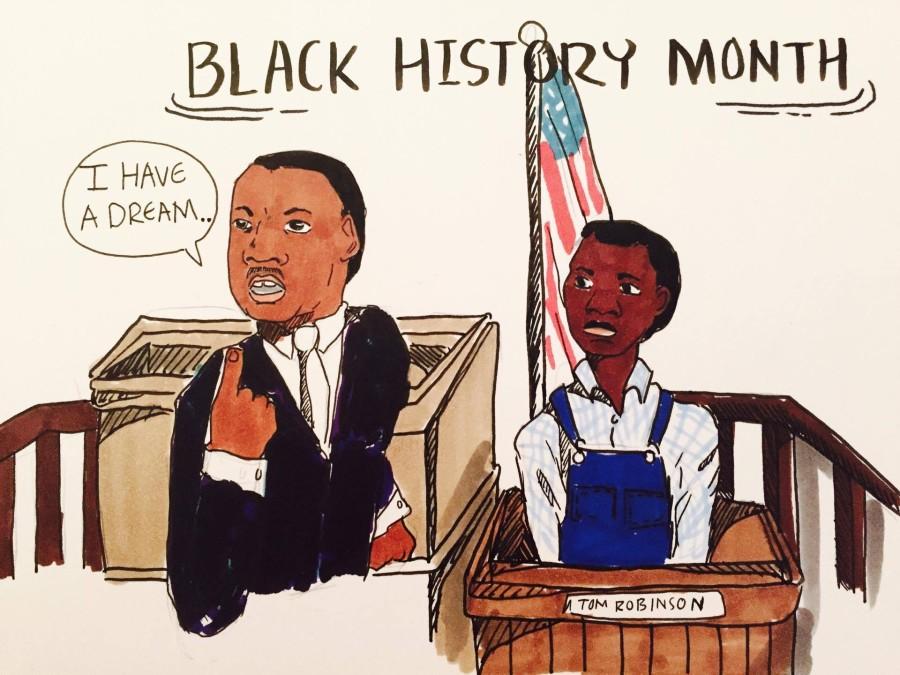The Bar-On Brief: It’s a sin to kill a mockingbird
As Black History Month comes to an end, its purpose is questioned

“Shoot all the bluejays you want, but it’s a sin to kill a mockingbird.” – Harper Lee
Lee, author of “To Kill a Mockingbird,” passed away last week at 89. May she rest in peace.
She died in February, designated the annual Black History Month.
Originally “Negro Awareness Week,” the movement garnered recognition by various city mayors who promoted the study of African-American history. It later evolved into Black History Month and gained momentum on college campuses during the Civil Rights Movement of the 1960s. In 1976 President Gerald Ford formally recognized the month.
And what has HHS done this Black History Month? Nothing out of the ordinary, really.
Students, on the other hand, have taken initiative. The Black Student Union was granted permission to be a school-sponsored club this semester, and they did raise awareness of black history.
They spoke about Black History Month’s origin and educated the community with historical knowledge, sharing a different fact every day on the morning announcements.
Even with all the support from students, there has been debate over the necessity and alleged racism of the month.
“There is no White History Month,” opponents argue.
But the history of African-American people is very different from that of Caucasian Americans. Other American groups have faced challenges in their conquests for equality — to be equal with the white American male.
Check your history textbooks. How many pages are dedicated to white European males, and how many pages depict the life of minority groups?
That’s why we have Women’s History Month next month, and that’s why President Obama designated June to be LGBT Pride Month.
One can argue these months undermine equality, that these days elevate a certain group of people based on something they are embedded with and cannot change about themselves. Well, the truth is these people do need an elevation in our current society.
Don’t get me wrong, I wish we didn’t need these months. I wish racism did not exist, I wish women were paid the same as men and I wish the rights of the LGBT community would be respected by all.
African Americans have had the biggest victory of all the groups mentioned. The mistreatment of African Americans reached extreme levels compared to other minority groups.
They came to this country mainly as slaves, fought in the Civil War in the 1860s and earned the right to vote in 1870. Their communities were terrorized by the Ku Klux Klan and Jim Crow laws in the 1900s. They fought for civil rights with Martin Luther King Jr. in the 1960s and were victorious. We even elected an African American president in 2008.
Despite these victories for equality, America is not yet free of racism. African Americans are still discriminated against in our police force, our courts and our prisons.
Why is it a sin to kill a mockingbird? Because, as Harper Lee explains, mockingbirds do no harm to people: “They don’t eat up people’s gardens, don’t nest in corn cribs, they don’t do one thing but sing their hearts out for us,” Lee writes in her novel.
It’s the same thing with Black History Month. While our school may not do all that much in its honor, it will always be there. It does no harm. To take it away would be to kill a mockingbird.
And with that, I rest my case.









Tej Gokhale • Feb 24, 2016 at 7:31 pm
Hey! Very well written article!
I would be careful though by saying that African-Americans have had the biggest victory of all other marginalized groups. That kind of language promulgates the idea of “oppression Olympics” or the idea that some people’s struggles have been harder than others. All these marginalized groups have had struggles and successes – LGBT has gained that same security of African-Americans after being shunned and put to death (for example the disgusting number of transgender youth abused and killed). What’s important to remember is that ALL oppression is negative.